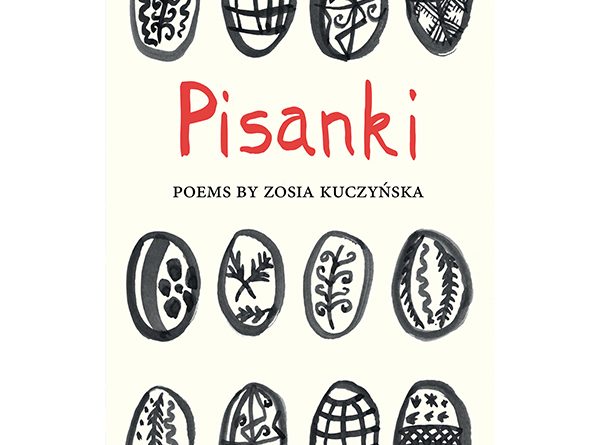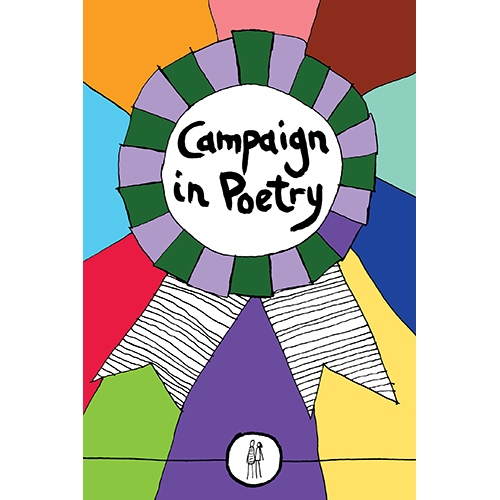Pisanki by Zosia Kuczyńska
– Reviewed by Edward Ferrari –
As the name suggests, Zosia Kuczyńska’s Pisanki (meaning painted easter eggs), largely conforms to a conventional mainstream poem-as-beautiful-crafted-object poetics. Some readers will find this familiarity reassuring, yet the collection may also be more subversive than this reading suggests. Rather than a homey “tapestry of lyric poems,” as Bernard O’Donoghue has it in his introduction, the politics of each poem seem to ironically comment on their apparently seamless inheritance of an ‘English way’ of writing poetry. The blank-verse sonnet “Rochdale Nativity,” while seemingly about the successful integration of the speaker’s daughters into British culture, is deceptively complex. Here are the final seven lines of the poem:
You long to pray like her—your little queen,
her hands in easy worship, safe within
the tangibility of make-believe—
whose heart and soul are homophones reserved
for the mastery of second languages.
Across the stream that fathers cannot ford,
you send delighted ripples of applause.
The poem is very beautiful, and typical of Kuczyńska’s achievement of a muted lyrical aesthetic. Yet, while performing a celebration of “norms that have been achieved in the new home,” as O’Donoghue describes it, this poem can also be said to adopt a much more ambivalent stance on such cultural norming, which is essential to Kuczyńska’s poetry.
The speaker only “long[s] to pray like her” daughter, who is— in a ironizing move that destabilizes easy sentiment—literally her “little queen” in the play; the act of believing one belongs is an act that comes easily to children, but not to the adult speaker. It’s a sad, ironic poem that undercuts the “easy worship” of sentiment.
The relative or friend depicted in the almost-sonnet “Sarah Jane’s Geranium” also underscores this risk in trying to think clearly about belonging. Another poem about “the way you think of home”, the speaker has amassed “centuries of clutter in a box / too big to keep it in,” but is still unable to ‘live’. This stark meditation on the émigré’s experience risks cliché and a particularly Polish brand of tęsknoty (longing/nostalgia), but it is ultimately a risk that pays off.
Like “Sarah Jane’s Geranium”, almost all the poems in this selection ironize the conventions of such sentiments in order to better perceive the real political effects of displacement. Kuczyńska seeks to recognize and refigure this ‘longing’ for home in the pamphlet as a whole, but this impulse is most obviously present as she writes the history of her grandmother’s deportation to Maharashtra in India, and eventual emigration to England. These poems – “Brother Staś”, “The train from Arkhangelsk to Bukhara” and “Dresses”, among others – are the pamphlet’s most obvious strength, and will be the reason many readers pick up Pisanki in the first place.
The selection also contains a surprise or two, such as the sequence of poems based on Chinese characters. “土 (Earth)” creatively engages with “the hardest part” of being “far from home” by playing with the punning visual/verbal connotations of the characters. 家, or the ideogram for “home,” forms the basis for the second poem in this sequence, which literally deconstructs the form of the character (roughly, “pig under roof”) to reflect on what happens when you “take away the garden”, “take away the roof”. The drawback of the ingenuity of this sequence is that it makes the seemly comportment of lyrics like “Dresses” seem ineffective by comparison.
Despite largely conforming to the conventions of mainstream British lyric, it would be a mistake to read the politics of Kuczyńska’s poetry as one-dimensional. A remarkable tale of displacement becomes the basis for a cohesive collection that is beautiful in familiar ways, yet incisive and timely in others. It doesn’t hurt that The Emma Press have produced yet another gorgeous pamphlet that presents Kuczyńska’s work in the best possible light.





